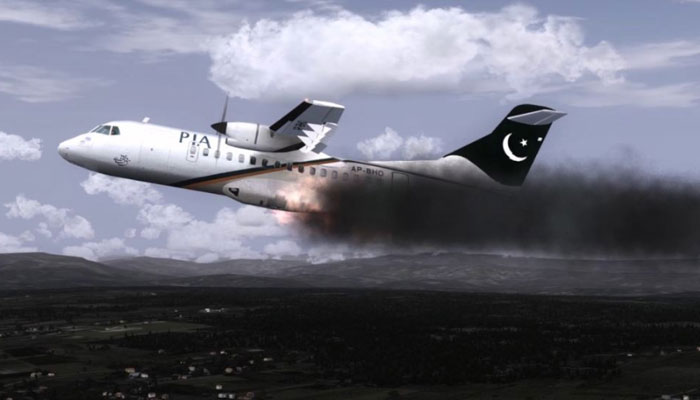Families of PIA plane crash victims demand new DNA tests
Relatives of victims of the illfated Pakistan International Airlines (PIA) flight PK-8304 criticised the Sindh government at a press conference at the Karachi Press Club on Saturday and shared how they had suffered at the hands of bureaucratic red tape in receiving the bodies of their loved ones.
The families demanded that DNA tests be conducted again on all the bodies buried on the basis of the results of the International Centre for Chemical and Biological Sciences (ICCBS), the University of Karachi. Dr Ahmed Murtuza had lost his brother, Mujtuba Murtuza, in the plane crash that happened on Friday, May 22, two days before Eidul Fitr, but he hasn’t received his body yet. The result of the DNA sample which his father had given twice to the ICCBS never came. Other families dispatched on their own his father’s sample to the Punjab Forensic Science Agency’s (PFSA) and received the result the same day.
“It was body number 112 with Chipa,” he said. Mujtuba’s wife, Fizza, told The News that Mujtuba’s body had already been taken to Lahore by the family of a PIA steward on that plane, Abdul Qayyum, on May 28. Qayyum also lost his life in the plane crash and his family had mistakenly taken Mujtuba’s body. She shared how Qayyum’s family had their DNA tests again in Lahore, which didn’t match the body they had buried. “I personally spoke to Qayyum’s wife to allow them to change the tombstone, so that the they wouldn’t need to exhume and bring the body back to Karachi,” he said, adding that even the PIA and its staff and the police tried to convince them, but their family wasn’t listening.
The PFSA, she said, had samples of only 52 bodies and was asking for the samples of all the bodies, so that Qayyum’s body could also be located. There are still two bodies yet to be handed over to the families of the plane crash; however, none of them is of Qayyum. After the Sindh government left the families running frompillar to post in a complete administrative chaos, Arif Iqbal Faruqui, who lost his three children and wife in the incident, shared that a Punjab Forensic Science Agency’s team in Lahore did visit Karachi for the DNA tests, but they were not supported by the Sindh government. After the crash, he said, there wasn’t any counter or focal person. After he had made a video and released it on social media, the PFSA team contacted him. “After I had sent my sample to the PFSA, I got a call fromChipa and Edhi that they had received bodies,” he recalled, adding that there were several claimants to one body. The family members were somuchmentally pressurised that whosoever got which body took it. He said that the ICCCBS issued flawed reports of several bodies. Ghazal Baig had lost her brother, Mirza Waheed Baig, in the plane crash. She also couldn’t get the body of her brother until she took the issue on social media.
“The ICCBS did not guide us at all,” she said, adding that they had to send their DNA samples to the PFSA on their own. The body number which they got through the PFSA’s DNA testing, she pointed out, was being handed over to some other families. A similar story was of Mobin Idrees, who had lost her sister-in-law in the tragic incident. The ICCBS not only delayed the results, but their testing was flawed, he said. At Edhi, he said, the body number which they got after the PFSA’s DNA testing was being handed over to some other family. “Even the family which was being given the body by Edhi on the basis of the ICCBS results was not satisfied,” he said, adding that both the families had to go for retesting and sent their samples on their own to the PFSA. ICCBS lambasts PFSA ICCBS Director Dr Iqbal Choudhary told The News that out of 97 samples they had received they performed DNA tests on 53, as instructed by the government, as the rest of the bodies had already been taken away by the families on the basis of facial recognition. Ideally, in the rest of the world, he said, bodies were taken into the custody by some disaster management authority, which releases them after proper verification. The ICCBS director stressed that there cannot be any difference between their and the PFSA’s results, says the ICCBS’s machines are of high precision and cannot make such errors. “There can be issues with body tagging,” he pointed out, adding that tagging was not their work.
The ICCBS, he said, received samples in the shape of bones or teeth, based on tagged numbers, which were done by a medico legal officer. Meanwhile, according to a press statement from the ICCBS, the Sindh Forensic DNA and Serology Laboratory (SFDL), University of Karachi, had employed all the international quality standards while carrying out forensic DNA analyses of the submitted samples related to the unfortunate incident of the PIA plane crash. “The laboratory relates the results of its reports with the tested items only, while sampling, coding, tagging and handing over of bodies to legal heirs remain the responsibility of the medico legal department,” said Choudhary in an executive meeting held at the SFDL meeting room on Saturday. SFDL Incharge Dr Ishtiaq Ahmed and other officials were also present on the occasion. He expressed serious concerns over the false allegations levelled over some results of DNA tests in a talk show of a private channel. He said, “Unfortunately, a malicious media campaign is going on by certain elements to undermine the efforts of the SFDL as the first standard laboratory of the Sindh province.” After the plane crash, the SFDL was assigned the national job of identification of the dead bodies of victims, he explained, adding that reference samples (samples of relatives) were collected at the Sample Receiving Unit of the SFDL by fulfilling all the legal requirements and documentation. Samples from the bodies were collected by medico legal officers under the supervision of the police surgeon of Karachi and submitted by the police to the SFDL along with a request from the competent authority to proceed for analysis, he mentioned.
Talking about the unnecessary interference by the PFSA, Ahmed said that after the incident, while the SFDL sample receiving unit was receiving reference samples, a team of PFSA personnel visited the unit on May 23. The team demanded of the SFDL officials to hand over samples and case records to them, he said. “However, they remained unable to produce any authorisation from the competent authority for their involvement in this case,” he said. The legal requirements were amicably explained to the team for their intended involvement, he said, adding that later the SFDL tried to engage the PFSA through proper channel, but its request of collaboration was not responded positively. “It is obvious that forensic samples and case records cannot be shared with anyone without authorisation of the competent authority,” he pointed out, adding that the PFSA collected samples from bodies without authorisation and fulfilling legal requirements. The PFSA received and analyzed reference samples provided to them without maintaining the chain of custody, he maintained. Given the fact that sampling of the PFSA was not supervised by medico-legal officers, no chain of custody was maintained, and the sampling and coding did not match that of the SFDL, and as a result its reports could not be used in comparison with the reports of the SFDL at any legal grounds, he stressed. It is unfortunate that this media campaign is being fanned by some high officials of the PFSA, ignoring their own illegal and unauthorised intervention in the case, against Sindh’s official lab that fulfilled all the legal requirements while proceeding with analysis, he said. The SFDL maintained a complete record of the process, raw data, profiles and analysis of all generated reports and was ready to prove the scientific accuracy of its analysis, he stated.
-
 John F. Kennedy Jr. Wife Carolyn Bessette's Last Minute Bridal Crisis Revealed
John F. Kennedy Jr. Wife Carolyn Bessette's Last Minute Bridal Crisis Revealed -
 Mary Cosby Remembers Son Robert Cosby Jr. After His Tragic Death
Mary Cosby Remembers Son Robert Cosby Jr. After His Tragic Death -
 Prince Harry, Meghan Markle Face 'largely Unfair' Criticism After Jordan Trip
Prince Harry, Meghan Markle Face 'largely Unfair' Criticism After Jordan Trip -
 Priscilla Presley Makes Sweet Confession About TV Role: 'I Lied'
Priscilla Presley Makes Sweet Confession About TV Role: 'I Lied' -
 Prince Harry Feels 'hurt' For Archie, Lilibet
Prince Harry Feels 'hurt' For Archie, Lilibet -
 Keith Urban, Nicole Kidman's Daughters Choose One Parent To Side With
Keith Urban, Nicole Kidman's Daughters Choose One Parent To Side With -
 Sarah Ferguson's Hidden Trait Exposed As Expert Dismantles Shadow Side To Her Personality
Sarah Ferguson's Hidden Trait Exposed As Expert Dismantles Shadow Side To Her Personality -
 Sarah Ferguson Backed By Powerful Friends Amid Epstein Fallout
Sarah Ferguson Backed By Powerful Friends Amid Epstein Fallout -
 PINK’s Latest Move Sparks Speculations About Replacing Major Celebrity On Show
PINK’s Latest Move Sparks Speculations About Replacing Major Celebrity On Show -
 Planetary Parade 2026: Here's How To See Six Planets Aligning Today
Planetary Parade 2026: Here's How To See Six Planets Aligning Today -
 Christopher Nolan Reveals Why He's A Fan Of 'Fast & Furious' Movies
Christopher Nolan Reveals Why He's A Fan Of 'Fast & Furious' Movies -
 Ben Affleck Unable To Accept A New Lover Post Jennifer Lopez Divorce As He Still Grieves End Of Bennifer 2.0
Ben Affleck Unable To Accept A New Lover Post Jennifer Lopez Divorce As He Still Grieves End Of Bennifer 2.0 -
 Why Is Demi Moore Being Called Ozempic Victim?
Why Is Demi Moore Being Called Ozempic Victim? -
 Kaley Cuoco Makes Honest Comparison Of 'Big Bang Theory' And 'Charmed' Gigs
Kaley Cuoco Makes Honest Comparison Of 'Big Bang Theory' And 'Charmed' Gigs -
 Robert Picardo Shares Surprising Reaction On Returning To The 'Star Trek' Franchise
Robert Picardo Shares Surprising Reaction On Returning To The 'Star Trek' Franchise -
 AI Feud Deepens As Musk Targets OpenAI Over Safety Concerns
AI Feud Deepens As Musk Targets OpenAI Over Safety Concerns




